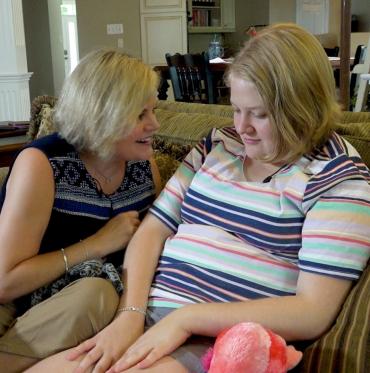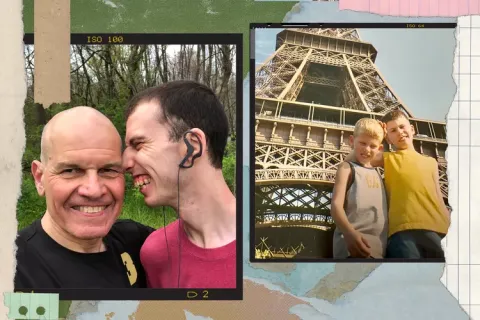Meet Annie K.
Annie K., 19
Early intervention is vital to optimal outcomes and progress for individuals with autism. Annie is living proof of this, as she has defied her predicted path at diagnosis of never being able to speak, read or write.
Famed actor Robert DeNiro once said, “you don’t need words to express feelings.” Although he was likely referring to his life’s work on the big screen, these words can be seen in the actions of our everyday lives. A BIG smile. A piercing gaze. Jumping for joy with reckless abandon! These simple acts of physical expressions are just a few of the ways our emotions can often speak even louder than our words.
For 17-year-old Annie, a spunky teenager with a zest for life and an unbridled resiliency, she has never relied on words to express herself - not because she doesn’t want to - but because her autism makes it extremely difficult for her. Diagnosed when she was two years old, Annie is considered minimally verbal and has verbal apraxia, a speech disorder in which a child's brain has difficulty coordinating the complex oral movements needed to create sounds into syllables, syllables into words, and words into phrases. Because of this condition, she leans mainly on single words and sounds to convey her thoughts and feelings. But when Annie really wants to get her point across, all you need to do is look at the expression on her face and it will tell you everything you need to know.
Annie lives with her mom, Amy, who apart from being a mother of three teenagers, is the national director of family engagement for Devereux Advanced Behavioral Health, one of the nation’s oldest and largest non-profit providers of behavioral healthcare. She uses her professional skills combined with her 19 years of on-the-job-training as a mom to provide her daughter with every possible resource to live her happiest and most fulfilling life.
Learn more about Annie in this Q&A:
How old was Annie when she was diagnosed with autism spectrum disorder?
Annie was 15 months old when we realized she wasn't developing according to the typical milestones, so we began with a developmental evaluation. On the day before her second birthday, she was officially diagnosed with autism spectrum disorder.
In your experience with Annie, how important is early intervention?
Early intervention is vital to optimal outcomes and progress for individuals with autism. Annie is living proof of this, as she has defied her predicted path at diagnosis of never being able to speak, read or write. Although Annie is minimally verbal, she speaks (and uses her iPad to be understood more clearly) and can both read and write. She even does Google searches! If we didn't begin services when we realized her delays at a young age, I'm certain she would not have made the progress she has to date.
Implementing early intervention services can be hard - it changes a family's schedule, their lifestyle and can feel overwhelming and limiting, but knowing that it is key to long term quality of life and personal success for that individual and family, is KEY to surviving the early intervention years. Short-term inconvenience for long-term success.
Did you realize something was different about Annie before her diagnosis?
Looking back, I can see red flags that showed Annie was 'different' than typical children. At the time, I attributed it to personality or normal developmental differences, but it was not. Annie always had some sensory differences - she would love really cold wind in her face while her brothers would have their breath taken away, or when I nursed her, she would try and face away from me, rather than snuggling into her mom. She also wasn't interested in other people or their faces, she was TOUGH to make giggle and didn’t really coo or babble. These things, now, all add up to her early signs of autism.
Tell us about some of the things Annie struggles with as a result of her ASD, and please share some of the areas where she excels.
Annie struggles with communication, social skills and connecting with people in the 'mainstream' way. She still has tantrums and has little safety awareness, and has difficulty with self-help skills, like dressing and hygiene. Her fine motor and gross motor coordination skills are a challenge - she can't tie her own shoes or ride a bike.
But given ALL of these challenges Annie faces, she has proven to be INCREDIBLY resilient and self-determined. She has learned how to express herself and her desires clearly with limited language. She has learned to stick with tough tasks until she masters them, even when she is frustrated or doesn't understand the point of them initially. She has learned how to show love and to show her sense of humor. She is absolutely AMAZING.
In your experience, what has life been like as a mom of a child on the autism spectrum?
I don't know that I could have said this at the time of Annie's diagnosis 16 years ago, but being the mom of a child with autism has truly been a blessing in disguise. Through Annie, I have learned to prioritize what is important to our family, to understand patience and perseverance in a way that I never knew before, and most importantly, to enjoy the 'little things' - that turn out to be the REALLY big, important parts in life. We still have trying, exhausting and rewarding days - and the future is scary to imagine, as things are unpredictable, especially once she turns 21 years old. But it is through Annie and her autism, and her wonderful brothers, that I have learned how to become the best mom I can be, and to really enjoy our life together.
How have Annie’s brothers played a role in providing her with guidance and support through the years?
Annie's brothers have only known our life with autism. They have always been very active and supportive in Annie's life, whether it is through modeling skills, participating in her therapy or supporting her through awareness events. Sure, they get frustrated with Annie (and she with them!), but ultimately, they have unconditional love for their sister and a bond that only they, as siblings, will truly ever understand. It takes ALL of our family to help Annie.
What advice would you give to other parents who have a child/children on the spectrum?
Don't be afraid of the autism journey - start early, advocate hard, follow through and know that it will get easier. And PLEASE, celebrate the accomplishments! This is how we all find happiness.
What is your connection to Autism Speaks and how have they provided support to you and your family?
Autism Speaks was the first organization that I turned to after Annie's diagnosis. In 2004, there were few resources for families to assist with awareness, advocacy, supports and resources. They were the only organization I found initially to help me learn about autism and how our family could appropriately support Annie and her services. I attended Walk For Autism Now in Philadelphia in 2004 - it was only the second one they ever held. I will never forget, as U2's song "Beautiful Day" played over the intercom, tears streamed down my face when I saw ALL of the other families who were there to walk for their own autism journey. It reminded me that I wasn't alone and that there are supports out there. It was incredible.
Five words that best describe your daughter, Annie.
Hero. Resilient. Brave. Happy. Loving.








